Prelude to Indian Army’s Siachen Trek (Part-I)
Siachen Glacier is far beyond what a common person’s imagination
can conjure up. Even though the Indian forces have been braving against
the formidable foe of weather and other extremities to hold on to the
lofty mountains, when I told my mother that I would be heading to
Siachen for a month long expedition being conducted by the Indian Army,
her question was if it was in China?
The question left me amused.
The Indian Army personnel have been imposing the national will in those
frigid heights and not many civilians are aware what it means to be at
that height where chocolate bars freezes so hard that it has to be used
as stepping stones. I was one of very few civilians, who were to get a
chance to experience first-hand how Indian armed forces personnel are
overcoming limits to human body at the world’s highest battlefield, even
if for a short period of time. I undertook the journey in 2008 and
after nearly a decade I am revisiting the journey that changed me.
 |
| Pangong Tso on Indo-China border |
 |
| Beautiful landscape of Ladakh (Nimo) |
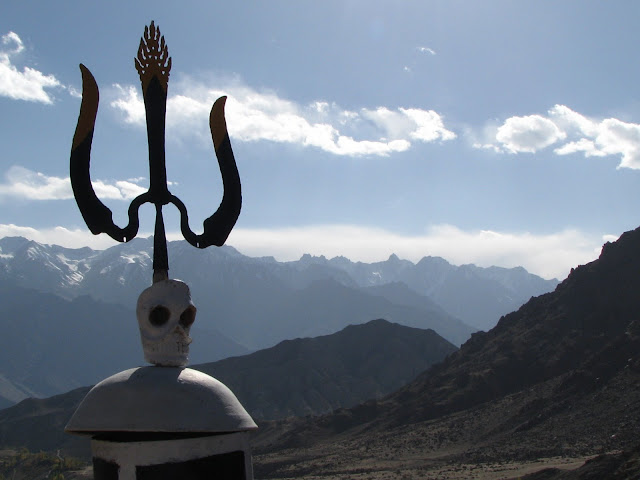 |
| View from Diskit monastery in Ladakh |
The
Indian Air Force’s (IAF) giant steel bird IL-76 took us from Chandigarh
airbase to Leh, which is one of the highest commercial airports in the
world at 10,682 feet. It was here we will set forth on our journey to
acclimatise to the weather that can be both enchanting and excruciating
at the same time. The lungs had to be accustomed to the lack of oxygen,
the brain had to maintain semblance of sense at high altitude, skin has
to withstand the chances of either getting sun-burned or having
frostbites and blood vessels had to keep the blood pressure within
limits. We were advised to get good sun glasses and sunscreen lotion,
rest the army was to take care of.
It was my maiden visit to
Ladakh and I instantly fell in love with the brown landscape that was
beautiful despite its barrenness. We were being given a slow
introduction to Ladakh – through day long trip to Pangong Tso (Tso means
Lake and this is a story for another day) and an extended stay in Karu
where our accommodation was just next to a mighty Indus river. After
about a week long acclimatisation in Leh we were to set course for
Siachen Base Camp. During the time, every day we had to undergo medical
tests that included a gauge on your blood pressure and most of the
people had their pressure almost sky rocketing. I hovered around a
comfortable 110/80 (normal is 120/80).
 |
| Another Postcard from Ladakh |
Tip: During this stage,
take ample rest as the atmosphere is rarefied and listen to your body.
Drink plenty of water it will help in faster acclimatisation.
We
traversed the Khardung La (La means pass) that boasts to be the highest
motorable road in the world at 18,380 feet. Despite having a military
background that took me to various remote places of the country, this
was my first experience of seeing and touching snow. At that height one
would be foolish to do running around and exhausting the body. Many who
reach Khardung La end up taking artificial oxygen at a small medical
unit set up by army. So ‘don’t be a gamma in the land of the lama’.
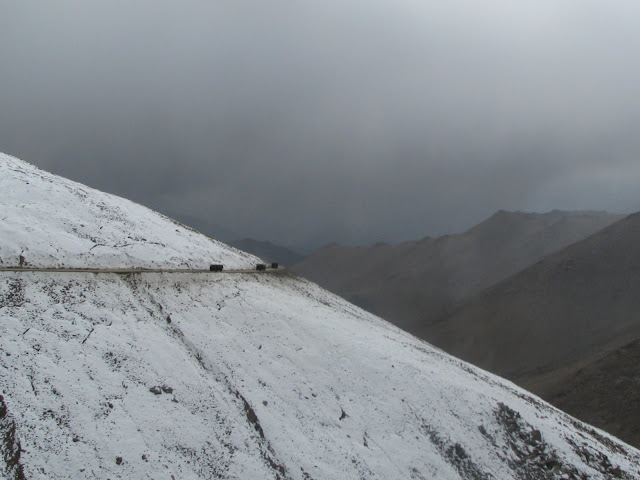 |
| On way to Khardung La |
After
letting our eyes feast on the breath-taking nature’s bounty, we made
our way to North Pulu, the Indian Army prepared a sumptuous meal for us.
With enough fire in our belly we made our way to Siachen Base Camp
located at the snout of the 76-km long Glacier. We reached around
mid-night only to be greeted by snowfall and welcoming army personnel,
who asked if we wanted to witness ‘Kalratri’ function- worshiping of
Goddess Kali on the 7th day of Navratri. Weary from our long road
journey and dazed by the high altitude of the base camp, roughly 12000
feet, we reached our accommodation (a pre-fabricated hut in which if one
leaves the Bukhari on the chances of setting it on fire are very high).
And boy we slept like a log as next day was going to be long.
 |
| Siachen Base Camp |
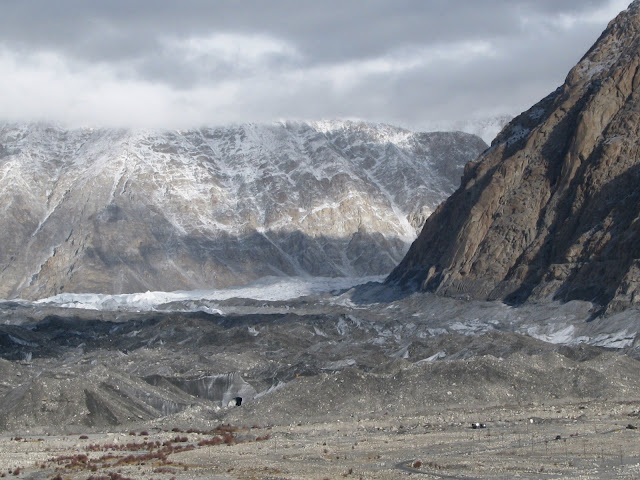 |
| Do you see the small opening that is the snout of the Glacier from where snow melts to form river Nubra |
We
had to begin our introduction to the basic mountaineering techniques
and get used to the clothing that will keep us warm when ‘the Winter
Comes’ (with the Game of Throne fever catching up, it was hard to resist
the phrase). The troops generally train here for 21 days before they
begin the arduous trek to the various posts along the Glacier, the
highest being the Bana post at 22,143 feet. The armed forces personnel
carry their complete load with them and it takes about a month to reach
there. One gets posted to the place for three months as scientists have
deduced that three months on the high altitude cuts five years from your
life expectancy.
We were not aware of these challenges yet,
for us the biggest challenge was to walk in a straight line wearing 4 kg
Scarpa trekking shoes. Our first day task was to walk in the base camp
to get accustomed to these heavy-weight shoes that have awakened every
muscle in our legs. On the second day we were taken to ‘the Wall’ to
practice ice-climbing and learn how to use various mountaineering
equipment. After the training we were examined on three counts – blood
pressure, oxygen level and ECG. Those manage to remain within the
permissible limits were allowed to proceed with the trek.
 |
| Learning Ice-Craft at "The Wall" |
 |
| Learning to walk in 4 kg Scarpas at Siachen Base Camp |
 |
| Siachen literally means a land with abundance of roses |
The
biggest motivation for me in those unforgiving climates have been the
ration of chocolates and dry fruits. Soldiers, who have been posted to
those heights for long, lose their appetite leading to severe weight
loss. But my metabolism ensured I was always ravenous. And this
greediness also made me ignore the advice by my team leader to only
carry in the back pack what was required. “Every extra gram would become
unbearable at those heights,” were his exact words. I decided to carry
as many chocolates as I could besides one litre of juice and one kg of
walnuts!
 |
| Dangerous and captivating at the same time! |
The first hour of the trek was the most treacherous.
Tied to a rope with four others, I was cursing my stars for opting for
this trek as with each step taken breathing became a task. In that
unknown extreme climate, more than half the battle is fought in the
mind. I had to kill my doubts or else I knew, I would never be able to
complete the trek. Steeling my resolve and hushing my doubts, thus began
my awestruck journey through the Siachen Glacier, a marvel of the
nature and a bone of contention between India and Pakistan.
(For more information on the itinerary of the trek please visit Siachen Trek: Experience of a lifetime
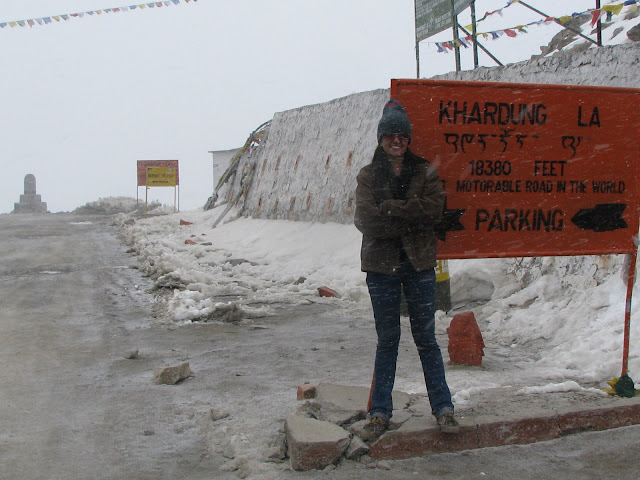



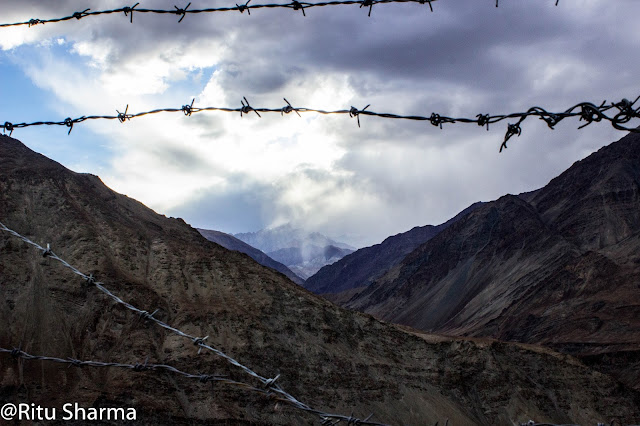

Comments
Post a Comment